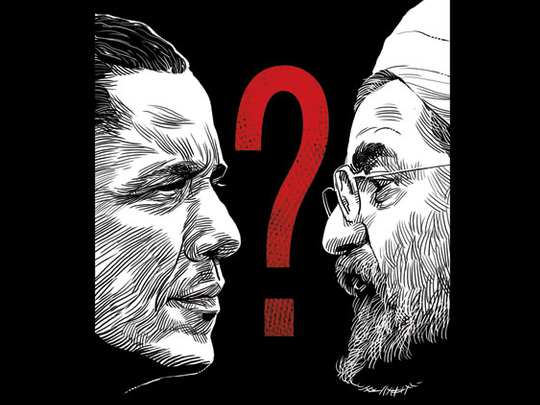
Last month’s developments in the Middle East signal a start of perhaps the most challenging reshuffle of 70-year-old alliances.
To start with, a series of seemingly unrelated events contributed to maintaining a smokescreen over the reality.
A new round of negotiations between Israel and Palestine had started in the midst of total indifference and false hopes. Israel goes on building illegal colonies and the US allows it, as most of the Arab world sheds crocodile tears.
The war in Syria goes on unabated. Saudi Arabia fuels forces there that it fights elsewhere and Russia adapts its support accordingly to the Bashar Al Assad regime. As everyone knows, no camp is now able to prevail. War can go on for years and consequently, thousands more Syrians will be killed.
Meanwhile, an unusual situation has emerged, with Saudi Arabia and Israel being seen walking side by side in their common fear of Iran. It all started with the worsening of ties between Saudi Arabia and the US, as highlighted by various elements: Comments by the US National Security Adviser Susan Rice about the new ‘Eastward’ US foreign policy; refusal by the Saudis to join United Nations Security Council; strong Saudi opposition to US President Barack Obama’s refusal to bomb Syria; bitter comments by Prince Bandar Bin Sultan of Saudi Arabia, opening up his heart to the French Ambassador in Riyadh.
Then, the unthinkable happened: A first-step nuclear agreement — on which the US had been working secretly for months — was signed between Iran and the five permanent Security Council members of the UN (US, Britain, France, Russia and China) plus Germany. A ‘historic’ agreement or a ‘historic mistake’, only future will tell. Yet, is the ‘nuclear’ part the moot point here?
Whatever the results after the six-month probation period, fact remains that sooner or later, Iran will have a nuclear arm. Nobody can contest the Iranians’ right to develop nuclear energy — and one knows that moving from civil to military applications takes time, but is achievable, especially when Iran already demonstrated its ability to enrich uranium up to 20 per cent. Even though the Iranians repeatedly denied they were looking for it, they will not forego such an element of sovereignty, especially when Israel or Pakistan already have it.
What will then happen?
The nuclear debate has been a fantastic tool in the hands of Israel to avoid talking seriously about peace with Palestine and the result achieved last week is an obvious embarrassment to them.
Regarding the Gulf Cooperation Council (GCC) states, it is in everybody’s benefit to live in peace with one’s neighbours and an agreement driving away any risk of war must be good news; more so, for the possibility of a solution in Syria. The Iranian ‘threat’ in the region — and further West — is not a lure, in terms of political, cultural and obviously, religious influence. For years, such risk was avoided — thanks to a natural protective frontier, that is a strong Iraq. Unfortunately, the insane policies of the US under George W. Bush resulted in a chaotic situation — and Iranian dominance. But one must cope with the prevailing situation and the majority of the GCC states have already understood that.
Yet, the new situation unveils a much wider, ongoing change and the US needs to establish proper, if not friendly, relationships with countries such as Iran or India in order to deal with China. The Middle East was important for the US mainly from the energy point of view, which shale gas production in the US has reduced. As to supporting tyrants in the region, as it has been doing for years, it seems the US is a bit tired of it. The Americans expected the Arab Spring would give them a way out. They supported the Muslim Brotherhood in that respect, but it did not work. Why would they commit more? Of course, they still have enough interest, especially in Saudi Arabia. However, if Saudi Arabia itself has no other recourse than sticking to the recently renewed ‘Quincy’ Pact’s benefits, America is now more free-handed and indeed has little to fear from them with some possible harassment in Egypt, Bahrain or in Turkey.
In the end, a US-Iran alliance may not be a threat to the GCC if the alliance is truly global, including the Israeli-Palestinian issue. If not, Arab countries should start thinking about their future security needs and strengthen their already strong links with other partners such as some European ones. More importantly, they must now be aware that the day a security issue occurs, they will not be allowed anymore to say that they did not know about it.
Luc Debieuvre is a French essayist and a lecturer at IRIS (Institut de Relations Internationales et Strategiques) and the Faco Law University of Paris.







